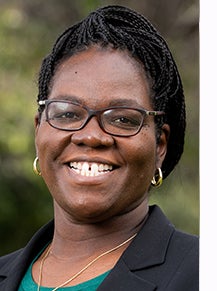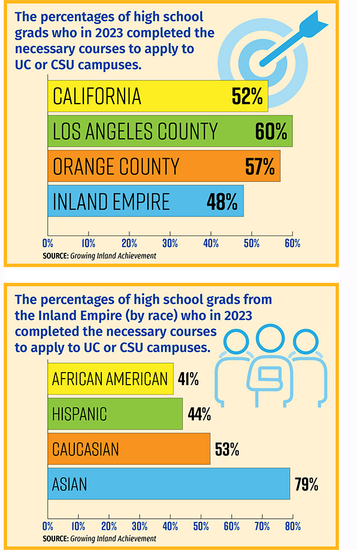
Typical 13-year-olds may not realize it, but the classes they take in middle school can determine whether they will go to college.
For instance, students who don’t take algebra by the 9th grade most likely will never later take high school physics or calculus—classes that are important for college admissions.
“The data shows us that getting into college is based on the courses that you were given, or not given, in middle school,” said Joi Spencer, the dean of UC Riverside’s School of Education.
“It is not only about what kids decide. It's also about what gets decided for them,” she added. “The challenging part is that a lot of times the children and their families simply do not know what classes they should take.”
To boost college access, UCR’s School of Education is reaching out to Inland Empire middle school students and their families through a Middle School Initiative aimed at helping them get on the right academic track for college.
The initiative includes:
• Sponsoring an essay contest in which middle school students are asked to write about the role of education in their lives.
• Sending representatives to eighth-grade promotion ceremonies to reach out to students and parents.
• Establishing a STEAM (science, technology, engineering, arts, and math) Academy summer day camp for middle school students on the UCR campus to expose them to the wonders of college.
The School of Education is approaching the initiative with a sense of urgency because of a disparity in the number of Inland students who don’t take the classes they need to go to a state university, Spencer said.
Less than half—48%—of Inland Empire high school graduates in 2023 completed the coursework they would need to apply for college in the University of California and California State University systems, according to Growing Inland Achievement, an Inland Empire educational collaborative group, which includes UCR. Inland graduates lagged their peers in Los Angeles and Orange counties, where 60% and 57%, respectively, completed such coursework.
What’s more, Inland Empire minoritized students fared worse than their white and Asian peers, with only 41% and 44% of African American and Hispanic students, respectively, completing college prep classes with a “C” grade or better to be considered for UC or CSU admissions.
The Middle School Initiative works to increase those numbers. It is a broad umbrella events and activities to help young people develop stronger academic identities and defeat systems and structures that inhibit their access to education, Spencer said.
“We know that young people begin to define themselves at this age, but they also begin to be defined by society,” Spencer said. “Maybe some people see you as a football kid. And that's okay. But could you also be a football kid and a science kid?”
The STEAM Academy will run this summer as a pilot program for two weeks between 9 a.m. and 4 p.m. on the UCR campus with slots for 60 students. The students will be broken into smaller groups or “pods,” each led by UCR undergraduate and graduate student mentors.
“They will be exposed to a really rich and super interactive series of experiences in visual mathematics, engineering, and of all kinds of science and arts,” Spencer said.
Participating families will not be charged. The students are being recruited through Inland Empire school districts. Spencer expects the academy to grow in the coming years and to be offered to as many as 120 middle school students.
“Students and families need to know we are here, and we're thinking about what's coming next for them,” Spencer said.





